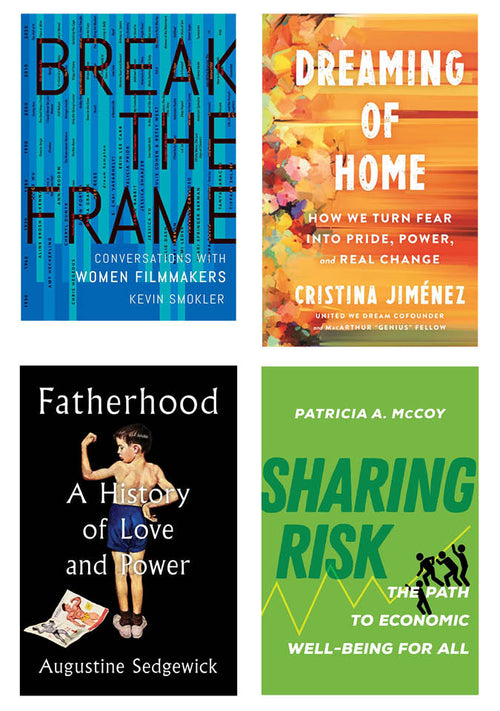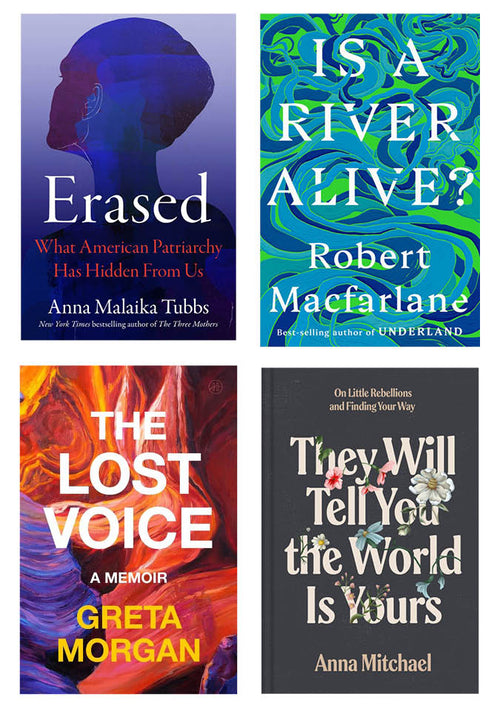New Book Releases for the Week of November 26, 2024
Featuring new book releases from Emily Mester, Stephanie Gorton, Michael Tondre, and Auden Schendler
Finding the right book at the right time can transform your life or your organization. As expert booksellers, we help you discover your next great read by showcasing four recently released titles each week.
The books are chosen by Porchlight's Managing Director, Sally Haldorson, and the marketing team: Dylan Schleicher, Gabbi Cisneros, and Jasmine Gonzalez.
(Book descriptions are provided by the publisher unless otherwise noted.)
Our Recommended Books This Week

Jasmine’s pick: American Bulk: Essays on Excess by Emily Mester, published by W.W. Norton & Company
Americans are caught up in bulk. We guiltily watch Amazon boxes pile up on the porch, wade through endless reviews to find the perfect product, and crave the comforting indulgence of a chain restaurant.
In American Bulk, Emily Mester intertwines cultural critique and personal history to explore how the things we buy, eat, amass, and discard become an intimate part of our lives. With humor and sharp intellect, she reflects on the joys and anxieties of family Costco trips, how a seasonal stint at Ulta Beauty taught her the insidious art of the sale, and what it means to get Mall Sad. In a nuanced examination of diet culture and fatness, Mester recounts her teenage summer at fat camp and the unexpected liberation she finds there. Finally, she ventures to Storm Lake, Iowa, to reckon with her grandmother’s abandoned hoard, excavating the dysfunction that lies at the heart of her family’s obsession with stuff.
American Bulk introduces readers to a striking new literary talent from the American heartland, one who dares to ask us to regard consumption not with guilt but with grace and empathy.
Sally’s pick: The Icon and the Idealist: Margaret Sanger, Mary Ware Dennett, and the Rivalry That Brought Birth Control to America by Stephanie Gorton, published by Ecco
In the 1910s, as the birth control movement was born, two leaders emerged: Margaret Sanger and Mary Ware Dennett. While Sanger would go on to found Planned Parenthood, Dennett’s name has largely faded from public knowledge. Each held a radically different vision for what reproductive autonomy and birth control access should look like in America.
Few are aware of the fierce personal and political rivalry that played out between Sanger and Dennett over decades—a battle that had a profound impact on the lives of American women. Meticulously researched and vividly drawn, The Icon and the Idealist reveals how and why these two women came to activism, the origins of the clash between them, and the ways in which their missteps and breakthroughs have reverberated across American society for generations.
With deep archival scope and rigorous execution, Stephanie Gorton weaves together a personal narrative of two fascinating women and the political history of a country rocked by changing social norms, the Depression, and a fervor for eugenics. Refusing to shy away from the enmeshed struggles of race, class, and gender, Gorton has made a sweeping examination of every force that has come in the way of women’s reproductive freedom.
Brimming with insight and compelling portraits of women’s struggles throughout the twentieth century, The Icon and the Idealist is a comprehensive history of a radical cultural movement.
Dylan’s pick: Oil by Michael Tondre, published by Bloomsbury Academic
Black gold. Liquid sunlight. Texas tea. Oil remains the ur-commodity of our global era, having been distilled from ancient algae and marine life to turn modernity’s wheels. Wars are fought over it. Some communities are displaced by its extraction, so that others may reap its benefits. But despite its heated history, few will ever see oil on the ground. Shrouded within a labyrinth of oil fields, pipelines, and manufacturies, it tends to be known only through its magical effects: the thrill of the road, the euphoria of flight, and the metamorphic allure of everything from vinyl records to celluloid film and synthetic clothing.
Michael Tondre shows how hydrocarbon became today’s pre-eminent power. How did oil come to structure selfhood and social relations? And to what extent is oil not only a commercial product but a cultural one—something shaped by widely imagined dreams and desires? Amid a warming world unleashed by fossil fuels, oil appears as a rich resource for thinking about histories of globalization and technology no less than the energetic underpinnings of literature, film, and art.
Gabbi’s pick: Terrible Beauty: Reckoning with Climate Complicity and Rediscovering Our Soul by Auden Schendler, published by Harvard Business Review Press
Apple calls its headquarters the greenest building on Earth. Microsoft announces an ambitious commitment to carbon negativity while simultaneously sponsoring an oil conference in Saudi Arabia. American businesses, communities, and individuals assiduously measure their carbon footprints, then implement voluntary emissions reduction programs, all while trumpeting their do-gooderism.
The problem is, none of this—individual efforts at recycling or carbon-focused corporate sustainability tactics—will make even a dent in solving the civilizational threat of climate change.
As corporate sustainability adviser and environmental activist Auden Schendler argues in this provocative, powerful book, we're living a big green lie. The hard truth: Much of the modern corporate green road map could have been written by the fossil fuel industry specifically to avoid disrupting the status quo. We have become somehow complicit.
But there is another truth: While ineffective or duplicitous environmentalism has become standard practice, we all have friends and family we love and care about, whose future depends on solving climate change. Conscience or faith tells us we have an obligation to repair the world. How can our common dreams be so at odds with our common practice? And how might we meld our spirit and passion to fashion a better future with meaningful action on climate change?
Schendler speaks to this profound contradiction and takes it head-on—with a bracing reality check on current practice, moving personal stories of parenthood and service, and innovative, real-world methods to tackle climate change at the corporate, community, and individual levels.
Terrible Beauty is a unique and essential road map for a new environmentalism, showing us that the key to saving the planet is to tap into our own humanity.
Buy these recommended new book releases and more directly from Porchlight Book Company.
Are you interested in buying multiple copies of the same book? We offer bulk discounts and flexible shipping, ideal for book clubs, employee resource groups, and other reading communities. Browse our product catalog or contact our customer service team to request a quote. Happy reading!




